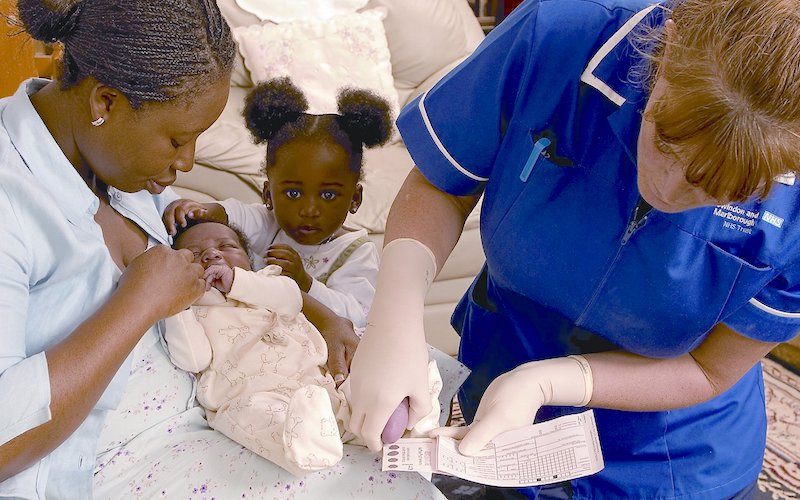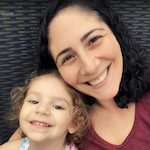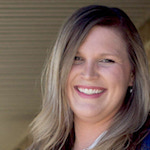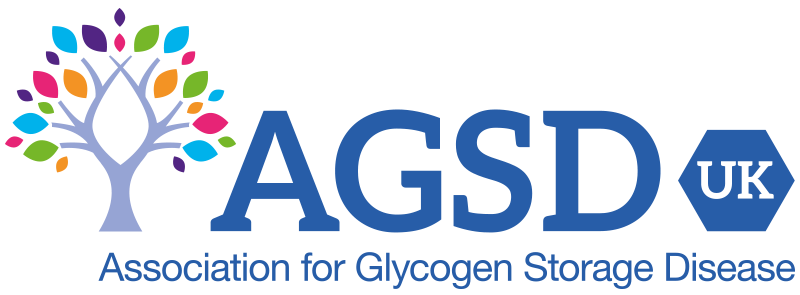AGSD-UK has long championed a number of causes, these have focussed on improving diagnosis and treatments.
This work continues alongside our latest campaign, announced below.

The introduction of new born screening for GSD

Photo courtesy of NHS new born screening, which as yet does not cover any GSD.
New born screening (NBS) has long been championed by AGSD-UK, and now with the increasing likelihood of the advent of gene therapy, initially for GSD1 and GSD3, it becomes even more important to have an early diagnosis.
New born screening for GSD2, Pompe disease, is now standard in 20 states across America and we believe Pompe should also be included in NBS in the UK. The availability of an enzyme replacement treatment for Pompe disease makes early diagnosis crucial. This is especially important for infantile onset Pompe disease, in which delays of days or weeks before the start of treatment can result in a reduced quality of life.
Even in the GSDs which are less immediately critical, too many of our members have experienced the frustration and despair of searching for many years to obtain a diagnosis. Some are finally diagnosed many decades after they could have been by NBS, with the attendant impact on their quality of life and on the workload and cost to the health service.
We continue to campaign for new born screening in the UK, working more widely with other interested parties. Babies born in other high-income countries are tested for up to 59 rare diseases, whilst in the UK they are tested for only 9. We are currently supporting the campaign led by ArchAngel MLD Trust and Nickie Aiken MP.
Read our News story and consider lending your support.
![]() Or go directly to Nickie Aiken MP’s page and the online petition.
Or go directly to Nickie Aiken MP’s page and the online petition.
Further evidence supporting the value of new born screening for Pompe disease
When enzyme replacement treatment starts earlier, outcomes are improved.
Crucial evidence has come from a recent research report in to the start of treatment for infantile-onset Pompe disease after diagnosis via new born screening. The conclusion is that high-dose ERT started at the earliest opportunity reduces the risk of mobility declining.
Life changing experiences of new born screening
In May 2020 we gathered stories of new born screening from mothers in the United States. They provide moving testimony to the impact of new born screening for Pompe disease.
Ashley’s story fom Cincinnati
My daughter Evie is now 15 months old. I fear without New Born Screening our lives this past year or so would have been a lot darker.
I can’t imagine the rollercoaster ride parents are on when trying to figure out what is happening to their perfect bundle of joy, as Pompe ravages through their tiny bodies within days of being born.
I can’t imagine the feeling of not knowing why my new born isn’t thriving. Wanting so badly to have answers. Wanting so badly to save my child but not know how.
The pain, fear and unknown can all be spared. We can spare parents these awful things with one simple test. The fact that NBS isn’t available for all is a huge disservice to our children.
They should all have the chance to thrive from the very beginning. Just like our Evie did.

Ashley Deidesheimer
Cincinnati
Jenna’s story from Chicago
I am a mother who lives in Chicago, Illinois, USA.
I had my first son in January of 2015. He’s a dream and everything I ever wanted. My husband and I tried for another baby in 2018. Our second son was born at the same hospital that year. Seven days after his birth, we received a call from our pediatrician stating we had an abnormal new born screening test.
Fast forward 20 months, both of my sons have tested positive for Pompe Disease. My oldest son missed new born screening in the state of Illinois by 6 months. Only because my second son was born with the disease did we find out about my oldest son. (There is a 25% chance in each pregnancy.) Because we know of their disease, we were able to meet with numerous doctors and clinicians to understand more about the disease and how to help them succeed in life given this diagnoses.
It was the worst mental journey of my life – I’m still in the midst of it. However, I can say that because we know, we can monitor and start treatment IMMEDIATELY so we can mitigate any muscle degradation (in the heart, diaphragm and other neuro-muscular muscles). Of all the rare diseases only 5% have a treatment and POMPE IS ONE OF THEM! How lucky are we?! Just knowing from NBS that they have the disease will literally save their lives, save my babies’ lives.
This is not the life I imagined for them or for my family, but it is the journey we are on. Because of NBS and ERT treatment, I can tell my children they will be okay.
New born screening saved my children’s lives, and mine (because I couldn’t live without my babies).

Jenna Yarborough
Chicago
Jennie’s story from New York
If you were given the chance, to save someone from physical harm before knowing they would suffer, would you?
My child was diagnosed with Pompe Disease on the New York New Born Screening in the United States of America in November of 2015. At that time, only two states in the entire country tested for Pompe Disease… two. “What about babies in the other 48 states of the country?” I thought to myself. Living in New York was our first blessing. The second was getting the diagnosis early enough where we could seek help and do something about it before the disease would prevent my daughter from living life to the fullest.
My daughter has been receiving Enzyme Replacement Treatments (ERT) every two weeks, since she was nine months old. She receives services such as Speech, Occupational Therapy, Physical Therapy, Aquatic Therapy and a SEIT (Special Education Itinerant Teacher) who provides one-on-one assistance at school. All of these therapies allow my daughter to thrive and be the happy little girl that she is today. These therapies started early and only started early because we knew her diagnosis at birth and were able to identify symptoms of the disease and get immediate help. It is vital to keep muscles at their optimal strength.
The same goes for starting ERT. We began treatment not too long after birth because of her diagnosis, and because of that prevented what would have eventually become tremendous muscle damage.
Thanks to Pompe Disease being on the new born screening panel, it gave my daughter that fighting chance that she deserved. Sadly, still today, not all of the states in the United States are screening for Pompe and this is also true around the world.
Why are we continuing to rob innocent babies of a fulfilling life by not having Pompe on the new born screening?
Why are we wasting precious time when we know every minute, every second counts when diagnosing this horrible debilitating disease?
It seems cruel and most definitely unjust.
As adults, we are the voices of these babies who cannot speak the words, “we want that fighting chance.” So why not help? Give these children the gifts bestowed upon other children as they grow; running, jumping, climbing without pain or struggle or the most vital blessings of being able to eat or even breathe on their own.
It is with great passion that I implore you to approve Pompe Disease to be placed on the UK New Born Screening. Here is your opportunity to ultimately save a precious life and alter thousands of lives as early detection is crucial to survival and a child’s ability to flourish.

Jennie Giusto
New York
Amanda’s story from Ohio
Shortly after my son Marshall was born, we received a call from his pediatrician explaining that his newborn screening (NBS) test showed a risk for a rare disorder called glycogen storage disease type 2, Pompe. My reaction was not to be overly concerned, knowing that some tests on the NBS panel have a high rate of false-positives. However, traveling to his first appointment with a cardiologist and geneticist the next day, I read a study on NBS testing. It described a high specificity for the method and I began to prepare myself for bad news.
Pompe is inherited in an autosomal recessive pattern, meaning that my husband and I must be carriers of a mutation in the GAA gene for there to be a chance that my son had the disease. A week later the genetic results showed that Marshall does have two mutations and is diagnosed with Pompe. Carriers of the mutation are asymptomatic and often have no idea they are passing on a mutation that causes such a devastating disease.
When considering what NBS has meant for us, I think about gratitude, heartache, and hope.
In those early days everything was so dark and terrifying, gratitude was not the first thing on my mind. However, without NBS, my son’s “late-onset” diagnosis, but early presentation, would have left us wondering why he wasn’t able to bring his hands or legs to midline, why he wasn’t rolling from belly to back, or back to belly, at that milestone age. Why he wasn’t able to steady his head or withstand more than a minute or two of activity without growing tired and irritable. Why his breathing was so labored or why he seemed so weak compared to our older children at that age.
This wondering and not knowing would have allowed the disease to progress and create irreversible damage. With early diagnosis, thanks to NBS, we were able to have testing to understand how the disease was progressing and begin treatment at two months of age, which increased his strength significantly and completely normalized his lab results.
It is so sad to know that others have to experience heartache where we have found gratitude. Sad that parents and unknowing adult patients are left searching for a diagnosis for sometimes a decade or more, while irreversible damage is happening that could have been slowed or prevented.
Lastly, I have so much hope that those who have not yet adopted the current screening method for Pompe, will realize how many people will benefit from its inclusion in the panel. This will allow others to find gratitude where there otherwise would have been heartache.

Amanda Joost
Ohio
